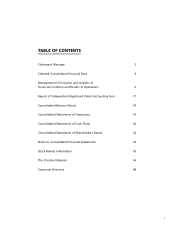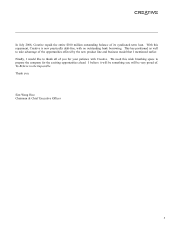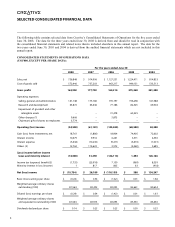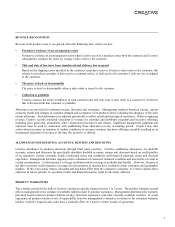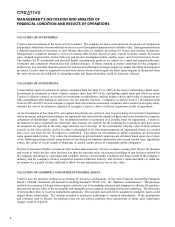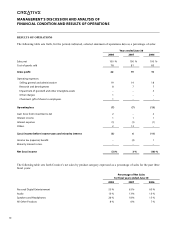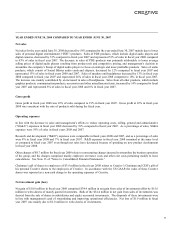Creative 2008 Annual Report Download - page 6
Download and view the complete annual report
Please find page 6 of the 2008 Creative annual report below. You can navigate through the pages in the report by either clicking on the pages listed below, or by using the keyword search tool below to find specific information within the annual report.
6
MANAGEMENT’SDISCUSSIONANDANALYSISOF
FINANCIALCONDITIONANDRESULTSOFOPERATIONS
SAFE HARBOR STATEMENTS UNDER THE PRIVATE SECURITIES LITIGATION REFORM ACT OF 1995
Except for the historical information contained herein, the matters set forth contains forward-looking statements and are
subject to certain risks and uncertainties that could cause Creative’s actual results to differ materially. Such risks and
uncertainties include: Creative’s ability to timely develop new products that gain market acceptance and to manage frequent
product transitions; competitive pressures in the marketplace; a reduction or cancellation of sales orders for Creative products;
accelerated declines in the average selling prices of Creative’s products or any prices of components; Creative’s ability to
successfully integrate acquisitions; potential fluctuations in quarterly results due to the seasonality of Creative’s business
and the difficulty of projecting such fluctuations; possible disruption in commercial activities caused by factors outside
of Creative’s control, such as terrorism, armed conflict and labor disputes; a reduction in demand for computer systems,
peripherals and related consumer products as a result of poor economic conditions, social and political turmoil; major health
concerns; the proliferation of sound functionality in new products from competitors at the application software, chip and
operating system levels; the deterioration of global equity markets; exposure to excess and obsolete inventory; Creative’s
reliance on sole sources for many of its chips and other key components; component shortages which may impact Creative’s
ability to meet customer demand; Creative’s ability to protect its proprietary rights; the vulnerability of certain markets
to current and future currency fluctuations; the effects of restricted fuel availability and rising costs of fuel; fluctuations
in the value and liquidity of Creative’s investee companies. For further information regarding the risks and uncertainties
associated with Creative’s business, please refer to its filings with the SEC. Creative undertakes no obligation to update any
forward-looking statement to conform the statement to actual results or changes in Creative’s expectations.
CRITICAL ACCOUNTING POLICIES AND ESTIMATES
GENERAL
Management’s Discussion and Analysis of Financial Condition and Results of Operations are based upon Creative’s
Consolidated Financial Statements, which have been prepared in accordance with accounting principles generally accepted
in the United States of America. The preparation of these financial statements requires management to make estimates
and assumptions that affect the reported amounts of assets, liabilities, revenues and expenses, and related disclosure of
contingent assets and liabilities. Management bases its estimates on historical experience and on various other assumptions
that are believed to be reasonable under the circumstances, the results of which form the basis for making judgment about
the carrying values of assets and liabilities that are not readily apparent from other sources. Actual results may differ from
these estimates under different assumptions or conditions.
Management believes the following critical accounting policies affect its more significant estimates and assumptions used
in the preparation of its consolidated financial statements:
Revenue recognition;
Allowances for doubtful accounts, returns and discounts;
Product warranties;
Valuation of inventories;
Valuation of investments;
Valuation of goodwill and other intangible assets;
Assessment of the probability of the outcome of current litigation; and
Accounting for income taxes.

